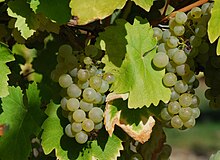| Folle Blanche | |
|---|---|
| Grape (Vitis) | |
 Folle blanche grapes | |
| Color of berry skin | Blanc |
| Species | Vitis vinifera |
| Also called | see list of synonyms |
| Origin | France |
| Notable regions | Western Loire (Pays Nantais) |
| Notable wines | Gros Plant du Pays Nantais |
| VIVC number | 4183 |
Folle blanche (French pronunciation: [fɔl blɑ̃ʃ] ), also known as Picpoule,[a][b] Gros Plant, and Enrageat blanc, is a wine grape variety from southwest France. It was the traditional grape variety in Cognac and Armagnac production until the 20th century. Folle blanche is an offspring of Gouais blanc, with the other parent so far unidentified.[1][2]
It has been mostly replaced by its hybrid offspring Baco blanc due to phylloxera damage. Baco blanc (also known as Baco 22 A) is a cross of Folle blanche and the Vitis riparia × Vitis labrusca hybrid Noah. Folle blanche is also the parent of the very hardy and disease-resistant Baco 1 (or Baco noir), a cross of Folle blanche and a Vitis riparia variety. Baco noir and Baco 22 A, like Folle blanche and their other parents, produce a very acid wine. This makes them more suited to distillation than less acidic grapes.
Folle blanche is used in the Loire Valley area and in Brittany around Nantes to produce Gros Plant du Pays Nantais, a very dry and often tartly acidic wine that pairs well with shellfish.[3] There it is used both in the production of table wine as well as eau de vie.
Cite error: There are <ref group=lower-alpha> tags or {{efn}} templates on this page, but the references will not show without a {{reflist|group=lower-alpha}} template or {{notelist}} template (see the help page).
- ^ Cite error: The named reference
VIVCwas invoked but never defined (see the help page). - ^ IFV: Le Folle blanche B Archived 2011-07-17 at the Wayback Machine, accessed 2010-11-24 (in French)
- ^ Vallée de Loire: Les cépages du Val de Loire (in French)